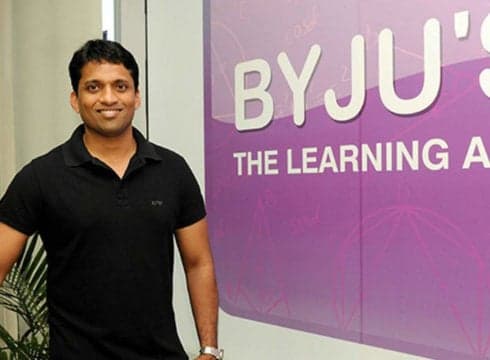BYJU'S was valued at $ 5.7 Bn in its last funding round
The edtech startup has raised over $819.8 Mn funding
In April 2019, BYJU’S crossed INR 200 Cr ($28.61 Mn) in monthly revenue
Inc42 Daily Brief
Stay Ahead With Daily News & Analysis on India’s Tech & Startup Economy
Bengaluru-based edtech company BYJU’S has issued fresh set of warrants to Bennett, Coleman and Co. Ltd (BCCL), popularly known as the Times Group, worth INR 3.9 Cr.
According to the Ministry of Corporate Affairs filings accessed by Inc42, in an extraordinary meeting on August 30, BYJU’S passed a resolution to offer and issue five warrants at a consideration of INR 78 Lakh each to BCCL.
Prior to this, Times Group held 5 equity shares and 5 warrants and post-investment, it will hold 5 equity shares and 10 warrants.
In simple terms, according to Investopedia, warrants are a derivative that gives the right, but not the obligation, to buy or sell a security—most commonly an equity—at a certain price before expiration. The price at which the underlying security can be bought or sold is referred to as the exercise price or strike price.
BYJU’S: Profitability, International Expansion And More
Founded in 2008 by Divya Gokulnath and Byju Raveendran, BYJU’S offers a learning app, which was launched in 2015 and has learning programmes for students in classes IV-XII along with courses to help students prepare for competitive exams like JEE, NEET, CAT, IAS, GRE, and GMAT.
BYJU’S was last valued at $ 5.7 Bn and has raised over $969.8 Mn funding from investors such as General Atlantic, Tencent, Naspers, Qatar Investment Authority, and Canada’s Pension Plan Investment Board (CPPIB) among others.
The company said that in April 2019, BYJU’S crossed INR 200 Cr ($28.61 Mn) in monthly revenue. Going forward, it is estimating revenue of over INR 3,000 crore ($429.3 Mn) this year. Some of the key performances of BYJU’S are:
- It claims to have over 35 Mn registered users
- 2.4 Mn paid subscribers, almost 100% up against 1.26 Mn in June 2018
- On average, the overall renewal rate stood at 85%
- 60% of students are from outside the top 10 cities
- Average number of minutes a student spends on the app is 71 minutes
Over the last year, the company’s fundraising has focused on international expansion. The expansion to the Middle East, the US, the UK, South Africa, and other African and Commonwealth market have been on the cards. Recently, BYJU’S tied up with Disney to launch Disney. BYJU’S Early Learn app for young children aged between 6 to 8 years old with Disney’s stories and characters from Disney Princess, Frozen, Cars, Toy Story franchises and more. This partnership is expected to help the company stand its ground in the US markets.
Challenges In Edtech Amid Increasing Investor Interest
The impact BYJU’S has created has been highlighted in Mary Meeker’s Internet Trends 2019 report. The report said that BYJU’S number of paying students between the ages of 9-17, had crossed over 1.5 Mn in March 2019 from the 1 Mn mark in the last financial year.
Digital evolution and the boom in smartphone adoption are expected to define the way Indian students learn. Real-time book updates, online tutoring, edutainment, online test preparation, web-based research, and gamification — technology has changed our traditional education system in more ways than one. With more than 260 Mn enrolments, India has the world’s largest K-12 (primary and secondary) education system.
According to DataLabs by Inc42, there were 3,500 edtech startups in India in 2018. Between 2014 and H1-2019, startups have raised $1.27 Bn across 287 deals. BYJU’S close competitors include Toppr and Unacademy, who are working towards domination Indian edtech segment, which is expected to be a $1.96 Bn market by 2021.
DataLabs noted that one of the reasons for edtech startups being unable to go mainstream and attract investments is lack of awareness about the latest education technology in the country.
Besides, jobs still demand conventional educational degrees recognised by designated educational boards. Most edtech startups are not certified by these boards. This makes it difficult for any company to create a business model that is both innovative and has the “Uber of Edtech” vibe so that entrepreneurs to win investors’ trust.
To support the sector, the government is working on national education policy as well. The draft policy has “proposed the revision and revamping of all aspects of the education structure, its regulation and governance, to create a new system that is aligned with the aspirational goals of 21st century education, while remaining consistent with India’s traditions and value systems.”
The draft policy says that technology will play an important role in the improvement of educational processes and outcomes. The draft policy says that the relationship between technology and education at all levels is bidirectional. Here are some key points discussed on this tech+education synergies.
{{#name}}{{name}}{{/name}}{{^name}}-{{/name}}
{{#description}}{{description}}...{{/description}}{{^description}}-{{/description}}
Note: We at Inc42 take our ethics very seriously. More information about it can be found here.


